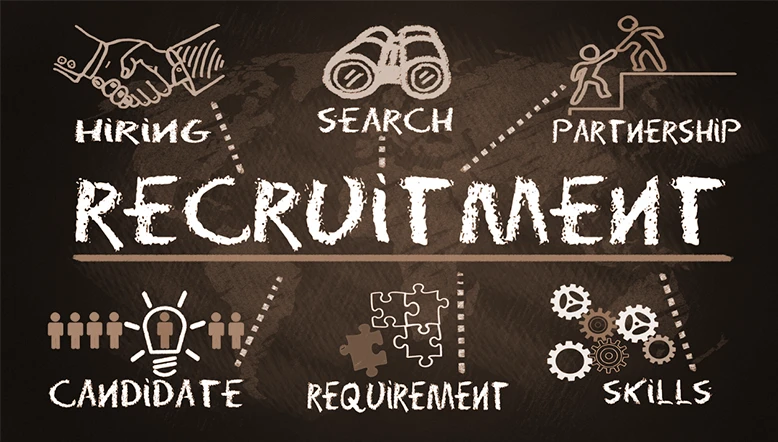The proliferation of Artificial Intelligence (AI) across various industries has become an undeniable reality. In the realm of Human Resources, and more specifically in recruitment, the impact of AI has been transformative. This potent blend of technology and talent acquisition has not only revolutionized the way businesses seek and secure top-tier talent but has also set new standards in efficiency and strategic hiring.
In this article, we’ll cover the changing role of AI in modern recruitment practices. We’ll delve into the mechanics of AI, its advantages in recruitment, real-world application examples, potential drawbacks, and future trends.
Whether you’re an HR professional seeking to streamline your processes, a business leader aiming for growth, or an enthusiast curious about the intersection of AI and recruitment, this exploration promises to be enlightening.
LOOKING TO HIRE? You can also contact our growth experts to learn more about our own recruiting solutions, which utilizes many of the strategies listed below.
The Evolution of Recruitment
Before delving further into AI, let’s cover the journey of recruitment, which has been one of constant evolution and adaptation. Let’s trace this transformative path:
- Word-of-mouth referrals: This was perhaps the earliest form of recruitment, relying on personal networks and recommendations. It was straightforward, but its reach was inherently limited.
- Newspaper advertisements: As businesses grew and media expanded, newspapers became the go-to platform for job postings. This significantly widened the reach of recruiters but offered little in terms of targeted hiring.
- Job boards: The advent of the internet saw the emergence of online job boards, making recruitment a truly global endeavor. Companies could now reach potential candidates across geographical boundaries, and job seekers had a plethora of opportunities at their fingertips.
- Applicant Tracking Systems (ATS): With the surge in online applications, managing and sorting through the influx of resumes became a challenge. ATS emerged as the solution, automating the collection and sorting of applications, but it still fell short in terms of personalization and efficiency.
- Artificial Intelligence: Today, the introduction of AI in recruitment has marked a revolutionary shift. It not only automated routine tasks but also brought a high degree of precision, personalization, and predictive capabilities to the recruitment process.
Keep in mind, this technology continues to evolve, shaping the future of recruitment.
What is Artificial Intelligence Recruiting?
Artificial Intelligence refers to the simulation of human intelligence processes by machines, particularly computer systems. It encompasses learning (the acquisition of information and rules for using it), reasoning (using these rules to reach approximate or definite conclusions), and self-correction.
AI is not a futuristic concept; it’s here, and it’s shaping the way we work, communicate, and even hire. In terms of recruitment, AI is leveraged to automate repetitive tasks, decipher complex data, provide actionable insights, and improve overall efficiency of the hiring process. For instance, AI can scan through hundreds of resumes in a fraction of the time a human would take, identifying candidates that best fit a job description based on predefined parameters. Furthermore, AI-powered chatbots can engage candidates in real-time, scheduling interviews, answering queries, and providing a seamless candidate experience.
AI’s role in recruitment is expansive and transformative, infusing the process with speed, accuracy, and an element of predictive analysis that was previously unheard of.
Advantages of Using AI in Recruitment
AI is not just a buzzword in the world of recruitment; it’s a game-changer. The benefits of AI in recruitment are manifold, ranging from increased efficiency to improved candidate experience.
1. Faster Candidate Screening and Shortlisting
With the capability to parse through vast amounts of data rapidly, AI significantly reduces the time spent on screening and shortlisting candidates. AI-powered tools can quickly analyze resumes, extract relevant information, and match it against job descriptions. This process, which could take hours if done manually, can be accomplished in mere minutes with AI. Moreover, these tools can learn from their interactions, improving their accuracy and efficiency over time.
2. Improved Candidate Experience Through Immediate Engagement
In today’s competitive job market, candidate experience is crucial. AI-powered chatbots can engage with candidates round-the-clock, providing immediate responses to queries, scheduling interviews, and keeping candidates informed about their application status. This level of engagement not only enhances the candidate experience but also positions the company as responsive and candidate-centric.
3. Reduction in Unconscious Bias
AI has the potential to make the recruitment process more equitable. By focusing solely on qualifications and skills, AI can help reduce unconscious bias that may seep into human decision-making processes. This not only ensures a fairer recruitment process but also promotes diversity within the organization.
4. Enhanced Data Analysis Capabilities
Finally, the ability of AI to analyze and interpret complex data sets is transformative. It can provide recruiters with insights about hiring trends, candidate preferences, and effective recruitment strategies. This data-driven approach facilitates more informed decision-making, helping organizations refine their recruitment processes and achieve their hiring goals more efficiently.
In essence, the integration of AI into recruitment holds the promise of a more streamlined, efficient, and equitable hiring process. It’s a powerful tool that, when used thoughtfully, can significantly enhance the effectiveness of recruitment strategies.
Real-World Example of AI in Recruitment:
A prime example of AI implementation in recruitment can be seen with Paradox. Paradox has developed an AI-powered assistant named Olivia, who is designed to engage with candidates on various platforms. Olivia’s AI capabilities enable her to learn about a candidate’s skills, expertise, and relevant job experience. Based on this acquired knowledge, she presents candidates with next steps, schedules interviews, and even answers company- or process-related questions using natural language technology. This innovative application of AI in recruitment enhances efficiency and provides a more personalized experience for candidates, illustrating the transformative potential of AI in the HR field.
Potential Disadvantages: AI Bias in Recruitment
While AI can help reduce human biases, it’s essential to recognize the inherent biases that AI can also create. AI algorithms, primarily learning from historical data, may inadvertently perpetuate existing prejudices. This occurs when the training data reflects past hiring practices that may have been biased against certain demographics. Consequently, AI can unknowingly replicate these biases, leading to a skewed screening process that favors certain candidate profiles over others. Such biases can manifest in various forms, from gender and racial biases to inadvertently favoring candidates from specific educational backgrounds or geographical locations. This not only limits the diversity of the workplace but also raises ethical and legal concerns, as it might contravene employment laws that advocate for equal opportunity.
To mitigate these biases, it’s crucial for organizations to critically assess and regularly audit their AI recruitment tools. Incorporating diverse datasets, implementing inclusive algorithm design, and maintaining transparency in the AI decision-making process are key steps in this direction. Moreover, balancing AI insights with human judgment remains imperative. Human HR professionals can provide context and empathy, qualities that AI currently lacks, ensuring a more fair and holistic approach to talent acquisition. By acknowledging and addressing AI biases, companies can harness the full potential of AI in recruitment, fostering a more inclusive and equitable hiring landscape.
Future Predictions and Trends in AI Recruiting
As we move forward, we can expect to see several key trends and predictions shape the future of AI in recruiting:
- Increasing adoption of AI: As companies continue to recognize the value and efficiency gains from AI, the adoption of AI-based tools in recruitment is likely to accelerate.
- Enhanced candidate experience: AI will continue to refine the candidate experience, delivering personalized, interactive, and responsive engagements.
- Predictive analytics: AI systems will become increasingly proficient at predicting job fit and success, making the hiring process more precise and successful.
- Bias reduction: AI has the potential to reduce unconscious bias in hiring decisions, fostering greater diversity and inclusion in the workplace.
- Integration with other HR functions: AI will not only transform recruitment but will also be integrated across various HR functions for a more cohesive, data-driven approach.
These trends paint an exciting picture of the future of recruitment, where AI plays a central role in creating more efficient, unbiased, and personalized hiring processes.
Conclusion
Artificial Intelligence is no longer a novel concept in the recruitment industry. It has proven its worth by streamlining processes, saving time, and enhancing decision-making with data-driven insights. The use of AI in recruitment is a significant leap towards a more efficient, objective, and candidate-friendly hiring process. As the technology continues to evolve, companies that leverage AI in their hiring practices will undoubtedly gain a competitive edge.
At 1840, we have embraced the power of AI to deliver top-tier talent solutions. We invite you to join us on this journey towards a future where AI and human expertise work hand in hand to redefine talent acquisition. Schedule a call with us to experience the difference AI can make in your hiring process.






